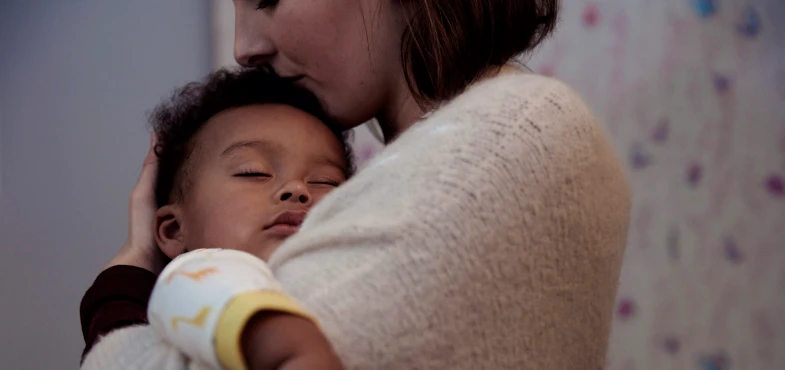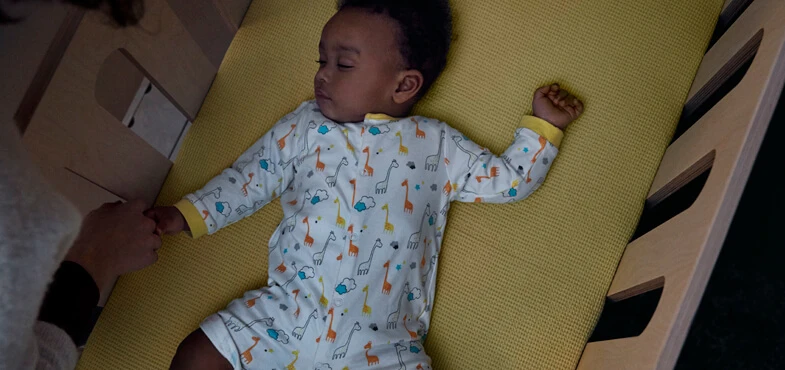All new parents will know how often babies tend to sleep. Though it might always seem that your baby never decides to nod off at the same time as you, they can sleep for up to 18 hours a day during the first year of their life.
Despite spending much of the day asleep, these periods of sleep tend to occur in small bursts, with your baby waking every couple of hours to eat. During this time, it’s important to start introducing a night-time routine that they can start to adapt to. This helps to get your baby used to sleeping for longer periods and associating certain times, such as the evening, with going to bed, which can be crucial in ensuring you get back to enjoying a good night’s sleep too.
Sleep is crucial for growth and repair, especially for young babies. It’s during these rest periods that much of their development takes place.
Many parents question how to get their baby to sleep through the night, or have other queries surrounding their little one’s sleep pattern. The truth is, every baby is different, but there are some general tips and tricks you can follow to help your child, and you, get a full night’s rest.
Where should a newborn sleep?
For the first few months at home, a newborn should be kept in the same room as you whenever they are asleep. It’s vital you keep an eye on your little one and the fact that you’re close to them will also help your child feel comfortable and safe.
A small, high-sided cot with a firm mattress and tight-fitted sheet is best. Regularly putting your baby to sleep in the same room can get them used to associating that place with rest, helping encourage them to fall asleep and letting them develop a sleeping pattern.
Your baby should not sleep in the same bed as you, as this can be dangerous and can lead to a reliance that is a hard habit to break later. You may find that they’ll only fall asleep when you’re holding them, or close by, which is fine, but always put them down in their cot to sleep once they’ve nodded off.
Baby bedtime routine
Establishing a bedtime routine with your baby can be a great way to get them used to sleeping at a certain time. As they get older, they will begin to associate certain rooms, or times, with heading to bed.
A daily evening routine helps slow down the day and shows your little one that it’s time to settle in for the night. There are a wide variety of activities you can include in a bedtime routine, many of which are great bonding exercises too:
Changing into pyjamas to help them become comfortable at night time
Putting your baby to bed in a darkened or dimmed room
Having a warm bath shortly before bedtime
Reading a bedtime story to help them fall asleep and eventually help your baby learn to talk
Listen to lullabies and slow, ambient music
It’s important to slow things down to get your child feeling tired. This is more likely to lead to them being able to sleep through the night, or at least for most of it.
Babies are unique of course, so yours may respond better to certain techniques than others. Likewise, your baby will have a different sleeping pattern to others and will nod off at different times.
How to get a baby to sleep
It can be tough at first to get your baby to sleep. But with the right routine, your child will soon be able to fall asleep on their own – giving you some much needed rest during the night.
At first, a newborn will sleep for much of the day for short periods, but as they get older they will become more accustomed to resting for longer spells. By the time they are around a year old, your little one may even be able to sleep the whole night through.
When it comes to helping your baby get to sleep, there are a few techniques you can try to make it easier:
Start your bedtime routine at the same time every day – this will help your baby get used to associating this time with sleeping.
Don’t feed just before bed – While your baby will likely wake for a feed during the night, it’s a good idea to feed them an hour or so before bed, so that they aren’t trying to fall asleep on a full stomach.
When should a baby be sleeping?
Babies will sleep at different times, depending on their age. The younger they are, the more hours they’ll need. A three-month old can sleep for as much as 18 hours a day, for example. Most babies will sleep in short bursts of anywhere between two and five hours. In the first year, your little one will likely wake during the night for a feed. It’s good to put your baby to bed at the same time every night to help establish a sleeping routine. Generally, times will differ with age, but should be something like1:
1 – 4 months – 8pm to 11pm
4 – 8 months – 5.30pm to 7.30pm
8 – 10 months – 5.30pm to 7pm
10 – 15 months – 5.30pm to 7pm
15 months – 5.30pm to 7.30pm
By following these tips and tricks, you’ll be best placed to make bedtime with your baby an easy part of their daily routine.
Find more advice and guidance on your baby’s early years with JOHNSON’S® Baby.
JOHNSON'S®Pioneering Safety and Science in Baby Care
We are committed to working with Parents, Healthcare Professionals and Scientists to ensure our baby products continue to deliver high standards of safety and care.




